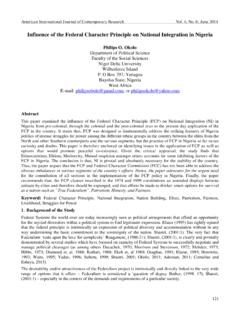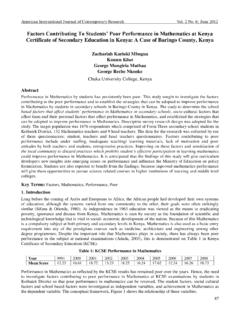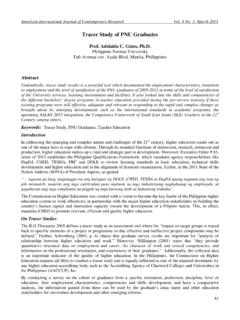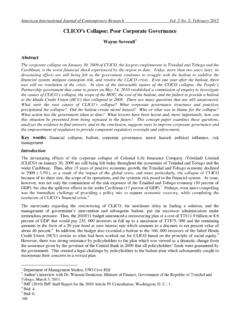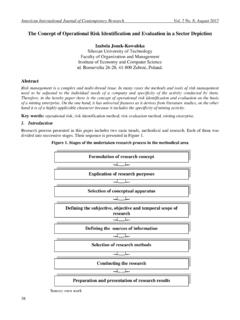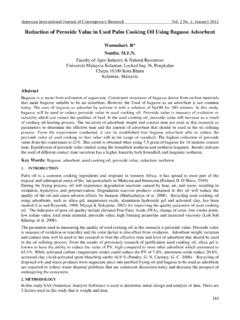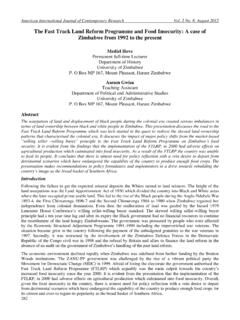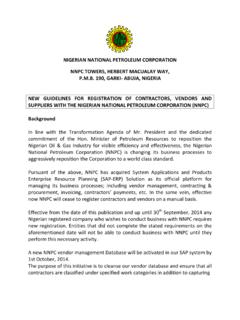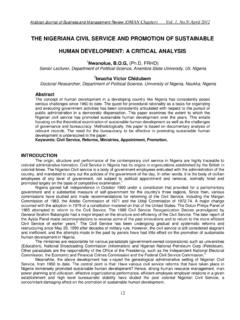Transcription of ECONOMIC IMPLICATIONS OF PETROLEUM …
1 American International Journal of Contemporary Research Vol. 2 No. 5; May 2012 60 ECONOMIC IMPLICATIONS of PETROLEUM Policies in Nigeria: An Overview Onyemaechi Joseph Onwe, School of Management Sciences National Open University of Nigeria 14/16 Ahmadu Bello Way Victoria Island Lagos Nigeria. Abstract The Nigerian PETROLEUM industry has been having major transformations since the discovery of crude oil in Nigeria in 1956. These transformations were no doubt due to observed lapses in administration of the PETROLEUM industry. The lapses were often accompanied by policy implementation problems that lead to social, ECONOMIC , and political issues on the specific benefits of PETROLEUM policies in Nigeria.
2 The argument has been that there are no recorded ECONOMIC benefits from PETROLEUM policies in Nigeria. In this presentation, we attempt to enumerate such benefits by examining some IMPLICATIONS of the various PETROLEUM policies. Our approach was basically descriptive in nature. Available time-series data on relevant variables were critically examined to ascertain the ECONOMIC IMPLICATIONS of the various PETROLEUM policies. Our findings reveal three major ECONOMIC IMPLICATIONS : first is observed rapid expansion of the number of ECONOMIC actors in the Nigerian PETROLEUM industry; secondly, we observed rapid development of the transport system; and, thirdly, there were improvements in the gross domestic product (GDP), foreign direct investment, and employment levels.
3 Some negative IMPLICATIONS of the PETROLEUM policies were also observed, especially in relation to consumption-related policies. A case in point was the fuel subsidy which had generated ECONOMIC problems ranging from scarcity of PETROLEUM products to loss of man-hours. There were also confusions on the actual beneficiaries of the said subsidy in Nigeria. The analysis also indicate that a major cause of these problems was ineffective administration of PETROLEUM policies in Nigeria. For some ways forward, the paper proposes the following strategies for administration of the PETROLEUM strategies in Nigeria. First is application of a disaggregated approach to policy formulation and implementation.
4 Stakeholders should be allowed to be fully involved. Second is a total deregulation of the PETROLEUM subsector, with the aim of minimizing free-market distortions. Third, we recommend strong emphasis on alternative sources of energy, given recent developments in the global market economy. The proposed emphasis on liquefaction of the Nigerian natural gas is a move in the right direction. 1. Introduction PETROLEUM , a very important source of energy and ECONOMIC commodity in Nigeria, has had so many problematic issues since the 1980s. There is the issue of subsidy, the issue of scarcity, the issue of sharing of revenues accruing from PETROLEUM , the fuel subsidy issue, which in December 2011 generated social and political problems that paralysed ECONOMIC activities nationwide, the issue of probes in the downstream PETROLEUM sub-sector, and recently, the issue of privatization and deregulation of the Nigerian Oil Industry.
5 It appears these problematic issues may have arisen due to some unfavourable characteristics of PETROLEUM policies in Nigeria. In this presentation, we examine critically the ongoing policies aimed at the development of PETROLEUM industry and the way forward. The presentation is organised as follows: section 2 summarises some background information on the Nigerian PETROLEUM industry; section 3 focuses on the contributions of PETROLEUM industry to growth of the Nigerian economy; section 4 focuses on the PETROLEUM policies in Nigeria; section 5 discusses the ECONOMIC IMPLICATIONS of the policies; and, in section 6, we conclude with some ways forward in the PETROLEUM industry.
6 2. Some Background Information on the Nigerian PETROLEUM Industry The history of PETROLEUM industry in Nigeria reveals that oil was discovered in Nigeria in 1956 at Oloibiri in the Niger Delta. The discovery was made by Shell-BP. Nigeria joined the ranks of oil producers in 1958 when its first oil field came on stream producing 5,100 barrels per day. After 1960, exploration rights in onshore and offshore areas adjoining the Niger Delta were extended to other foreign companies. Centre for Promoting Ideas, USA 61 In 1970, Nigeria was able to reap instant riches from its oil production.
7 The country joined the Organisation of PETROLEUM Exporting Countries (OPEC) in 1971 and established the Nigerian National PETROLEUM Company (NNPC) in 1977, a state owned and controlled company which is a major player in both the upstream and downstream sectors. By the late 1960s and early 1970s, Nigeria had attained a production level of over 2 million barrels of crude oil per day. Although production figures dropped in the eighties due to ECONOMIC slump, 2004 saw some improvements in oil production to a record level of million barrels per day. Current development strategies aim at increasing production to more than 4 million barrels per day. The Nigerian PETROLEUM industry has been described as the largest among all industries in the country.
8 This is probably due to the belief that PETROLEUM is one of the major sources of energy worldwide. The size, international characteristic, and role assumed by the PETROLEUM industry were noted to have originated from the notion that PETROLEUM is versatile as it currently satisfies a wide variety of energy and related needs. PETROLEUM is the most vital source of energy, providing over 50 percent of all commercial energy consumption in the world. The revenues obtained from crude oil in Nigeria are of absolute advantage to expenditure commitments on various projects at the local, state, and federal levels. The Nigerian economy relies heavily on the revenue derived from PETROLEUM products, as they provide 70 percent of government revenue and about 95 percent of foreign exchange earning.
9 Apart from this, the contribution of PETROLEUM to national development is many and varied; employment generation, foreign exchange earnings, income generation, industrialisation, and improvements in other ECONOMIC variables. While the major investors in the PETROLEUM industry are the international oil companies (IOCs), the principal legislation governing PETROLEUM operations in Nigeria is the PETROLEUM Profit Tax Act (PPTA) of 2007. Its main fiscal instrument is the PETROLEUM Profit Tax (PPT). Under the PPT, the tax rate was set at percent for the first five years of operations by the oil company and 85 percent thereafter. 3. Contributions of PETROLEUM Industry to Growth of the Nigerian Economy The contributions of the PETROLEUM industry to growth and development of the Nigerian economy can be enumerated in terms of the industry s impacts on the ECONOMIC variables responsible for ECONOMIC growth in Nigeria.
10 The contributions of PETROLEUM industry can also be analysed in terms of its share of revenue generation in the Nigerian economy. The PETROLEUM industry has contributed immensely in both foreign exchange reserves and government revenues. It has been observed that the government share of crude oil revenue as a result of various joint venture agreements with the international oil producing companies is roughly 70 percent of revenues accruing from crude oil transactions. Table below summarises the contributions of oil earnings to revenue generation in Nigeria. Table : Oil Earnings and Non-Oil Earnings in Nigeria, 1990 2008 (N millions) Year TOTAL Oil Revenues Percent (%) Share Non-Oil Revenues Percent (%) Share 1990 98, 71, 26, 1991 100, 82, 18, 1992 190, 164, 26, 1993 192, 162, 30, 1994 201, 160, 41, 1995 459, 324, 135, 1996 523, 408, 114, 1997 582, 416, 166, 1998 463, 324, 139, 1999 946, 724, 224, 2000 1,906, 1,591, 314, 2001 2,231, 1,707, 903, 2002 1,731, 1,230, 500, 2003 2,575, 2,074, 500, 2004 3,920, 3,354, 565, 2005 5,547, 4,762, 785, 2006 5,965, 5,287, 677, 2007 5,715, 4,462, 1,200, 2008 7,866, 6,530, 1,335, Source.
